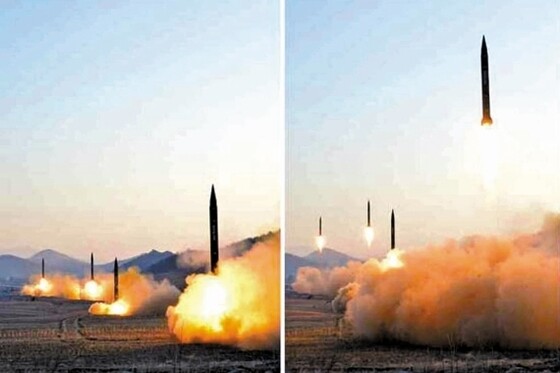hankyoreh
Links to other country sites 다른 나라 사이트 링크
Can the US really solve North Korean nuke issue on its own?

In a Financial Times interview on Apr. 2, US President Donald Trump said, “If China is not going to solve North Korea, we [the US] will.” The next question is what he actually meant by that, and how China will respond.
There appears to be little room for disputing that Trump’s remarks were made to pressure Beijing ahead of his Apr. 6-7 summit with Chinese President Xi Jinping. But experts were largely skeptical on whether the US could actually achieve a solution to the North Korean nuclear issue on its own.
“What Trump wants is North Korea’s denuclearization,” said Yonsei University professor emeritus Moon Chung-in.
“That brings with it the issue of guaranteeing [North Korea’s] security, but at the same time [Pyongyang] wants economic compensation. Trump has no economic incentive [to offer Pyongyang],” Moon continued. “That means it’s impossible for the US [to resolve the issue] on its own.”
On the issue of stiffer US sanctions and pressure against the North, a US-China relations expert said on condition of anonymity, “This probably means tougher independent sanctions [by the US], but that won’t have any effect without China actively going along.”
Many experts also said the Trump administration’s attempts to play the secondary boycott card were “unlikely to pan out,” since this would be tantamount to sanctioning China directly. In an Apr. 3 editorial - the day after it published its interview with Trump - the Financial Times observed that there were limits to Trump‘s approach, stressing that “the US cannot end the crisis alone, and China cannot stand by.”
Analysts took Trump’s remarks about the US “solving North Korea” on its own as reflecting Trump’s perceptions on the North.
“You can tell Trump’s ideas are rooted in a US-centered position that assigns responsibility to China, arguing that China is the reason North Korea isn’t going the denuclearization route,” said Yonsei University professor Choi Jong-kun.
It’s a very different take from China’s position, which holds that the North Korean nuclear issue is something Pyongyang and Washington must take action to resolve.
“The US and China are going to have a lot of trouble coordinating on North Korea issues,” Choi predicted.
Trump also cited trade as a possible inducement for China to work on resolving the North Korean nuclear issue. Another expert speaking on condition of anonymity said this approach “isn’t likely to work if you consider Trump’s current relationship with Congress.”
“Trade especially is an area that requires Congress’s ratification,” the expert said.
Korea National Diplomatic Academy professor Kim Han-kwon explained that from China’s standpoint, it is “being pressured into making a decision between the strategic interest of having North Korea as a strategic buffer zone and the economic interests from economic cooperation with the US.”
“This is going to be a serious burden for China, since it’s not clear just what Trump is aiming for,” Kim said.
By Kim Ji-eun, staff reporter
Please direct questions or comments to [english@hani.co.kr]
Editorial・opinion
![[Column] Park Geun-hye déjà vu in Yoon Suk-yeol [Column] Park Geun-hye déjà vu in Yoon Suk-yeol](https://flexible.img.hani.co.kr/flexible/normal/500/300/imgdb/original/2024/0424/651713945113788.jpg) [Column] Park Geun-hye déjà vu in Yoon Suk-yeol
[Column] Park Geun-hye déjà vu in Yoon Suk-yeol![[Editorial] New weight of N. Korea’s nuclear threats makes dialogue all the more urgent [Editorial] New weight of N. Korea’s nuclear threats makes dialogue all the more urgent](https://flexible.img.hani.co.kr/flexible/normal/500/300/imgdb/original/2024/0424/7317139454662664.jpg) [Editorial] New weight of N. Korea’s nuclear threats makes dialogue all the more urgent
[Editorial] New weight of N. Korea’s nuclear threats makes dialogue all the more urgent- [Guest essay] The real reason Korea’s new right wants to dub Rhee a founding father
- [Column] ‘Choson’: Is it time we start referring to N. Korea in its own terms?
- [Editorial] Japan’s rewriting of history with Korea has gone too far
- [Column] The president’s questionable capacity for dialogue
- [Column] Are chaebol firms just pizza pies for families to divvy up as they please?
- [Column] Has Korea, too, crossed the Rubicon on China?
- [Correspondent’s column] In Japan’s alliance with US, echoes of its past alliances with UK
- [Editorial] Does Yoon think the Korean public is wrong?
Most viewed articles
- 1‘We must say no’: Seoul defense chief on Korean, USFK involvement in hypothetical Taiwan crisis
- 2N. Korean delegation’s trip to Iran shows how Pyongyang is leveraging ties with Moscow
- 346% of cases of violence against women in Korea perpetrated by intimate partner, study finds
- 4Amnesty notes ‘erosion’ of freedom of expression in Korea in annual human rights report
- 5‘Weddingflation’ breaks the bank for Korean couples-to-be
- 6[Column] Park Geun-hye déjà vu in Yoon Suk-yeol
- 7Will NewJeans end up collateral damage in internal feud at K-pop juggernaut Hybe?
- 8Korea sees more deaths than births for 52nd consecutive month in February
- 9“Parental care contracts” increasingly common in South Korea
- 10[Interview] Dear Korean men, It’s OK to admit you’re not always strong